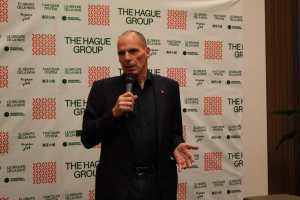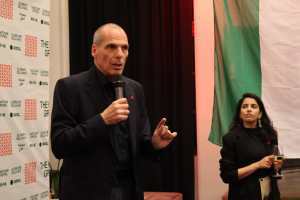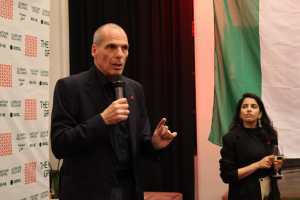Yanis Varoufakis's Blog, page 7
February 6, 2025
Novara Media’ Michael Walker and Yanis Varoufakis on Gaza, Trump’s Trade Wars, and DeepSeek
The post Novara Media’ Michael Walker and Yanis Varoufakis on Gaza, Trump’s Trade Wars, and DeepSeek appeared first on Yanis Varoufakis.
February 4, 2025
On Channel 4: Is Donald Trump’s tariff war about to backfire?
The post On Channel 4: Is Donald Trump’s tariff war about to backfire? appeared first on Yanis Varoufakis.
February 2, 2025
Justice for Palestinians will also emancipate Israelis and Europeans – My remarks at the Hague Group’s inaugural meeting reception


The post Justice for Palestinians will also emancipate Israelis and Europeans – My remarks at the Hague Group’s inaugural meeting reception appeared first on Yanis Varoufakis.
Η απελευθέρωση των Παλαιστίνιων ως προαπαιτούμενο για την απελευθέρωση Ισραηλινών & Ευρωπαίων: Δήλωση Γ. Βαρουφάκη στην έναρξη της Ομάδας της Χάγης 31-1-2025


The post Η απελευθέρωση των Παλαιστίνιων ως προαπαιτούμενο για την απελευθέρωση Ισραηλινών & Ευρωπαίων: Δήλωση Γ. Βαρουφάκη στην έναρξη της Ομάδας της Χάγης 31-1-2025 appeared first on Yanis Varoufakis.
January 30, 2025
Yanis Varoufakis in conversation with Francesca Albanese
The post Yanis Varoufakis in conversation with Francesca Albanese appeared first on Yanis Varoufakis.
January 28, 2025
Cloud Capital vs AI: What DeepSeek means for technofeudalism & the New Cold War
Note: The lack of a protective wall for US Big Tech is changing the landscape in the stock markets as well. Hardware companies, such as Nvidia, which produces microchips, will not be affected in the long term. But companies that rely on the commercialisation of software face Armageddon. For the rest of the economy, these changes will be momentous. AI seems to be becoming more accessible – which helps small and medium-sized enterprises but not necessarily employment, as the expansion of AI may well accelerate job losses. Furthermore, greater diffusion of AI will increase demand for electricity. In a Europe in the clasps of an electricity cartel, the increase in electricity prices hits people’s incomes even harder and highlights more strongly the need to de-commoditise and socialise not only AI but also the production & distribution of electricity.
The post Cloud Capital vs AI: What DeepSeek means for technofeudalism & the New Cold War appeared first on Yanis Varoufakis.
January 21, 2025
China’s Trump Dilemma – Project Syndicate
The post China’s Trump Dilemma – Project Syndicate appeared first on Yanis Varoufakis.
January 20, 2025
10 ΧΡΟΝΙΑ ΑΠΟ ΤΟ 2015 – Επεισόδιο 1ο: Ήταν προδιαγεγραμμένη η ήττα μετά την νίκη της 25 Ιανουαρίου;
 Ιδού λοιπόν το κλειδί της ερώτησης: «Ήταν μάταιη η διαπραγμάτευση;» Εφόσον προτιμούσαμε το Grexit από το 3ο μνημόνιο, όχι, δεν ήταν μάταιη. Αυτός άλλωστε ήταν ο λόγος για τον οποίο το σύνθημα με το οποίο κερδίσαμε τις εκλογές του Γενάρη 2015 ήταν: «Συμφωνία βιώσιμη μέσα στο ευρώ, αλλά όχι όλα για το ευρώ!» Κατεβήκαμε στις εκλογές (τουλάχιστον έτσι νόμισα) αποφασισμένοι να καταδείξουμε στους δανειστές την ειλικρινή μας διάθεση να εργαστούμε για την επίτευξη έντιμης επίλυσης του ελληνικού ζητήματος διαμηνύοντάς τους, παράλληλα, ότι –ενώ δεν απειλούμε με Grexit– ήμασταν έτοιμοι, ακόμα κι εάν εκείνοι μας απειλούσαν με Grexit, να απαντήσουμε σε επιθετικές τους κινήσεις (π.χ. κλεισίματος των ελληνικών τραπεζών) με ανάλογα και εύλογα αντίποινα (κούρεμα ομολόγων SMP της ΕΚΤ, ενεργοποίηση παράλληλου συστήματος πληρωμών κτλ.).Δυστυχώς, μετά την συνθηκολόγηση, ακούμε και διαβάζουμε καλοπροαίρετους σχολιαστές, ακόμα και πολλούς που διάκεινται επικριτικά απέναντι στην επιλογή Τσίπρα να ενδώσει στην τρόικα, και να αποκαλέσει την Ελληνική Άνοιξη «αυταπάτη», οι οποίοι αναρωτιούνται: «Και τι να έκανε όταν κατάλαβε ότι ο εχθρός [σημ.: εννοούν τον Σόιμπλε] επιζητούσε την εφαρμογή της απειλής μας, του Grexit; Να αποδεχόταν την καταστροφή που θα έφερνε το Grexit; Να συνέχιζε να μπλοφάρει με τους δανειστές, όπως ο Βαρουφάκης;»Δυστυχώς, η ήττα φαίνεται πως έφερε αμνησία ως προς το διακύβευμα της Άνοιξης, τους στόχους και τα μέσα μας!Πολύ πριν κερδίσουμε τις εκλογές, προειδοποιούσα τον Αλέξη να μη διανοηθεί καν να μπλοφάρει απειλώντας μ’ ένα Grexit το οποίο δεν είχε σκοπό να εφαρμόσει. Είχα μάλιστα γίνει και δυσάρεστος, καθώς, από το 2012, επέμενα ότι, την επομένη των εκλογών τις οποίες θα κέρδιζε, θα ερχόταν αντιμέτωπος με μια τρόικα που θα τον έσπρωχνε τεχνηέντως στο χείλος του Grexit, ώστε να διαπιστώσουν οι δανειστές αν εννοούσε αυτά που έλεγε.Πρόσθετα μάλιστα ότι η βιωσιμότητα της Ελλάδας εντός του ευρώ απαιτούσε από εκείνον, εκείνη τη στιγμή, να προτιμήσει το επαπειλούμενο Grexit από τη συνθηκολόγηση. Μόνον τότε μπορεί να υποχωρούσαν, δίνοντας στη χώρα τις ανάσες που χρειαζόταν, και άξιζε, εντός της ευρωζώνης.Είχα δίκιο όμως, το 2012, ή το 2015, ότι η βίαιη έξωσή μας από το ευρώ ήταν, παρά το τεράστιο κόστος της, προτιμότερη από τη συνέχιση των μνημονίων και του καθεστώτος χρεοδουλοπαροικίας που αυτά μας επιβάλλουν;Το σχετικό κόστος του GrexitΤο μέγα ερώτημα ήταν το εξής: Τι θα ήταν καλύτερο τον Ιούλιο του 2015; Ένα Grexit, το οποίο δε θέλαμε; Ή το 3ο μνημόνιο, εναντίον του οποίου εξεγερθήκαμε;Η απάντηση απλή: Το Grexit!Ναι, το κόστος θα ήταν σημαντικό. Το 2012 είχα μάλιστα χρησιμοποιήσει ακραίες εκφράσεις, λέγοντας ότι ένα Grexit θα μας πήγαινε πίσω στη νεολιθική εποχή. Όμως από τότε επέμενα: Αν δεν ήμασταν διατεθειμένοι να πούμε «όχι» σε νέα μνημονιακά δάνεια, ακόμα και υπό την απειλή του Grexit, η τρόικα θα συνέτριβε τη χώρα αφήνοντάς την εκτεθειμένη σε ένα μελλοντικό Grexit το οποίο θα ερχόταν όταν και εάν θα συνέφερε τους δανειστές, και με τη χώρα σμπαραλιασμένη. Όπερ και εγένετο! (Βλ. παρακάτω το γράφημα όπου φαίνεται η ραγδαία πτώση των εισοδημάτων την περίοδο 2012-2015.)
Ιδού λοιπόν το κλειδί της ερώτησης: «Ήταν μάταιη η διαπραγμάτευση;» Εφόσον προτιμούσαμε το Grexit από το 3ο μνημόνιο, όχι, δεν ήταν μάταιη. Αυτός άλλωστε ήταν ο λόγος για τον οποίο το σύνθημα με το οποίο κερδίσαμε τις εκλογές του Γενάρη 2015 ήταν: «Συμφωνία βιώσιμη μέσα στο ευρώ, αλλά όχι όλα για το ευρώ!» Κατεβήκαμε στις εκλογές (τουλάχιστον έτσι νόμισα) αποφασισμένοι να καταδείξουμε στους δανειστές την ειλικρινή μας διάθεση να εργαστούμε για την επίτευξη έντιμης επίλυσης του ελληνικού ζητήματος διαμηνύοντάς τους, παράλληλα, ότι –ενώ δεν απειλούμε με Grexit– ήμασταν έτοιμοι, ακόμα κι εάν εκείνοι μας απειλούσαν με Grexit, να απαντήσουμε σε επιθετικές τους κινήσεις (π.χ. κλεισίματος των ελληνικών τραπεζών) με ανάλογα και εύλογα αντίποινα (κούρεμα ομολόγων SMP της ΕΚΤ, ενεργοποίηση παράλληλου συστήματος πληρωμών κτλ.).Δυστυχώς, μετά την συνθηκολόγηση, ακούμε και διαβάζουμε καλοπροαίρετους σχολιαστές, ακόμα και πολλούς που διάκεινται επικριτικά απέναντι στην επιλογή Τσίπρα να ενδώσει στην τρόικα, και να αποκαλέσει την Ελληνική Άνοιξη «αυταπάτη», οι οποίοι αναρωτιούνται: «Και τι να έκανε όταν κατάλαβε ότι ο εχθρός [σημ.: εννοούν τον Σόιμπλε] επιζητούσε την εφαρμογή της απειλής μας, του Grexit; Να αποδεχόταν την καταστροφή που θα έφερνε το Grexit; Να συνέχιζε να μπλοφάρει με τους δανειστές, όπως ο Βαρουφάκης;»Δυστυχώς, η ήττα φαίνεται πως έφερε αμνησία ως προς το διακύβευμα της Άνοιξης, τους στόχους και τα μέσα μας!Πολύ πριν κερδίσουμε τις εκλογές, προειδοποιούσα τον Αλέξη να μη διανοηθεί καν να μπλοφάρει απειλώντας μ’ ένα Grexit το οποίο δεν είχε σκοπό να εφαρμόσει. Είχα μάλιστα γίνει και δυσάρεστος, καθώς, από το 2012, επέμενα ότι, την επομένη των εκλογών τις οποίες θα κέρδιζε, θα ερχόταν αντιμέτωπος με μια τρόικα που θα τον έσπρωχνε τεχνηέντως στο χείλος του Grexit, ώστε να διαπιστώσουν οι δανειστές αν εννοούσε αυτά που έλεγε.Πρόσθετα μάλιστα ότι η βιωσιμότητα της Ελλάδας εντός του ευρώ απαιτούσε από εκείνον, εκείνη τη στιγμή, να προτιμήσει το επαπειλούμενο Grexit από τη συνθηκολόγηση. Μόνον τότε μπορεί να υποχωρούσαν, δίνοντας στη χώρα τις ανάσες που χρειαζόταν, και άξιζε, εντός της ευρωζώνης.Είχα δίκιο όμως, το 2012, ή το 2015, ότι η βίαιη έξωσή μας από το ευρώ ήταν, παρά το τεράστιο κόστος της, προτιμότερη από τη συνέχιση των μνημονίων και του καθεστώτος χρεοδουλοπαροικίας που αυτά μας επιβάλλουν;Το σχετικό κόστος του GrexitΤο μέγα ερώτημα ήταν το εξής: Τι θα ήταν καλύτερο τον Ιούλιο του 2015; Ένα Grexit, το οποίο δε θέλαμε; Ή το 3ο μνημόνιο, εναντίον του οποίου εξεγερθήκαμε;Η απάντηση απλή: Το Grexit!Ναι, το κόστος θα ήταν σημαντικό. Το 2012 είχα μάλιστα χρησιμοποιήσει ακραίες εκφράσεις, λέγοντας ότι ένα Grexit θα μας πήγαινε πίσω στη νεολιθική εποχή. Όμως από τότε επέμενα: Αν δεν ήμασταν διατεθειμένοι να πούμε «όχι» σε νέα μνημονιακά δάνεια, ακόμα και υπό την απειλή του Grexit, η τρόικα θα συνέτριβε τη χώρα αφήνοντάς την εκτεθειμένη σε ένα μελλοντικό Grexit το οποίο θα ερχόταν όταν και εάν θα συνέφερε τους δανειστές, και με τη χώρα σμπαραλιασμένη. Όπερ και εγένετο! (Βλ. παρακάτω το γράφημα όπου φαίνεται η ραγδαία πτώση των εισοδημάτων την περίοδο 2012-2015.)
Η διακύμανση του τριμηνιαίου ελληνικού εθνικού εισοδήματος σε ευρώ για την περίοδο 2007-2017 – με τη συμπαγή γραμμή να καταδεικνύει τον κινούμενο μέσο όρο (διάρκειας ενός έτους) [στοιχεία ΕΛΣΤΑΤ, επικαιροποιημένα τον Σεπτέμβριο του 2017]. Οι δύο διακεκομμένες χρονοσειρές αποτελούν εκτιμήσεις (μία ουδέτερη και μία απαισιόδοξη) του μέσου όρου του ΑΕΠ μετά από ένα Grexit τον Ιούλιο του 2015. Οι εκτιμήσεις βασίζονται σε προβολές επί των ελληνικών μακροοικονομικών δεδομένων έξι επεισοδίων σπασίματος σταθερών νομισματικών ισοτιμιών (Βρετανία 1931, 1992, Ιταλία 1992, Μεξικό 1994, Βραζιλία 1999, Αργεντινή, 2002), λαμβανομένης υπ’ όψιν της προϋπάρχουσας εσωτερικής υποτίμησης (ιδίως στην περίπτωση της Ελλάδας).
Στις αρχές Ιουλίου του 2015, την εβδομάδα του Δημοψηφίσματος, ο πρωθυπουργός βρέθηκε αντιμέτωπος με την απειλή του Grexit σε μια συγκυρία όπου, μεσοπρόθεσμα, η συνθηκολόγηση και το 3ο μνημόνιο ήταν χειρότερη επιλογή από την αποδοχή του Grexit. Μην ξεχνάμε ότι τα capital controls που μας επέβαλε η τρόικα, και τα οποία πάσχισα με νύχια και με δόντια να αποτρέψω τους πεντέμισι μήνες της υπουργικής μου θητείας, είχαν ήδη βγάλει –στην ουσία– τη χώρα από τη νομισματική ένωση δημιουργώντας, ντε φάκτο, δύο νομίσματα: τα «χάρτινα», κανονικά, ευρώ και ένα παράλληλο νόμισμα, τα ευρώ που είχαν εγκλωβιστεί στις ελληνικές τράπεζες και, άρα, είχαν μικρότερη αξία (καθώς δεν μπορούσαν απρόσκοπτα να βγουν στο εξωτερικό).Με το κλείσιμο των τραπεζών, οι πολίτες έμαθαν το πλαστικό χρήμα, όπως θα μάθαιναν να χειρίζονται και το παράλληλο σύστημα πληρωμών που θα μας έδινε, κατ’ αρχάς, τη δυνατότητα να παραμείνουμε τύποις στο ευρώ για κάποιους μήνες και, εν τέλει, αν το Βερολίνο επέμενε στο Grexit, θα μπορούσε να αποτελέσει τη βάση για νέο νόμισμα. Με αυτά τα δεδομένα, και σε συνδυασμό με τις προβλέψεις του 3ου μνημονίου περί μονιμοποίησης της λιτότητας (έως το 2060), υπερφορολόγησης των αδυνάμων, χυδαίας νέας εκχώρησης του εθνικού (δημόσιου και ιδιωτικού) πλούτου και της εθνικής κυριαρχίας στους δανειστές και στα λοιπά αρπακτικά και της συνεχιζόμενης εις το διηνεκές μετανάστευσης νέων ανθρώπων, το αρνητικό σοκ ενός Grexit θα ήταν αδιαμφισβήτητα προτιμότερο!Τι θα συνέβαινε στην ελληνική οικονομία στην περίπτωση του Grexit εν μέσω θέρους του 2015; Το πιο πάνω γράφημα παραθέτει δύο εκτιμήσεις (βλ. διακεκομμένες καμπύλες): Η πιο αισιόδοξη εκτίμηση βασίζεται σε απλή προβολή της ιστορικής πορείας του εθνικού εισοδήματος χωρών που βίωσαν το απότομο και βίαιο σπάσιμο σταθερών ισοτιμιών (βλ. Βρετανία 1931, 1992, Ιταλία 1992, Μεξικό 1994, Βραζιλία 1999, Αργεντινή 2002). Και η πιο απαισιόδοξη εκτίμηση βασίζεται στην υπόθεση ότι, λόγω της ανυπαρξίας εγχώριων χαρτονομισμάτων, η άμεση μείωση του εθνικού μας εισοδήματος θα ήταν η διπλάσια εκείνων των συγκεκριμένων ιστορικών επεισοδίων.Ακόμα και με βάση το απαισιόδοξο σενάριο διαφαίνεται ότι η ανάκαμψη θα ξεκινούσε την άνοιξη του 2016, ότι έναν χρόνο μετά το σοκ του Grexit θα είχε αποσοβηθεί και, από το 2017, οι ρυθμοί ανάκαμψης θα ήταν εντυπωσιακοί, θέτοντας την ελληνική οικονομία σε τροχιά που καθιστά τη σημερινή μας κατάσταση αποτελμάτωσης και σταδιακής ερημοποίησης ακόμα πιο θλιβερή.Το κόστος του Εξάμηνου Ιανουαρίου-Ιουλίου 2015Στην προσπάθεια αμαύρωσης της αντίστασης του ελληνικού λαού, στη διάρκεια εκείνης της Άνοιξης του 2015, καταβλήθηκαν φιλότιμες προσπάθειες από την τρόικα εσωτερικού και εξωτερικού να παρουσιαστεί ως αυταπόδεικτο το ψεύδος ότι το πρώτο εξάμηνο του 2015, η Ελληνική Άνοιξη, σταμάτησε την ανάπτυξη που είχε αρχίσει το 2014 και κόστισε στην οικονομία έως και 200 δισ. ευρώ. Μια ματιά στο ίδιο γράφημα (βλ. πιο πάνω) αποκαλύπτει την πραγματικότητα, η οποία αρνείται πεισματικά να συμμορφωθεί «προς τας υποδείξεις» της τρόικας εσωτερικού και εξωτερικού.Η εικόνα του συνολικού εισοδήματος της χώρας (του λεγόμενου Ακαθάριστου Εγχώριου Προϊόντος), εκφρασμένου σε ευρώ, είναι ξεκάθαρη. Η μείωσή του αρχίζει με την παγκόσμια χρηματοοικονομική κρίση του 2008 και, από τότε, μέχρι και τις αρχές του 2014, επιταχύνεται ραγδαία, με μια συνολική απώλεια της τάξης του 25% και άνω. Από τα μέσα του 2014 περνάμε από τη ραγδαία πτώση στην αποτελμάτωση: πιο ήπιες μειώσεις του συνολικού εισοδήματος, οι οποίες, όμως, συμπίπτουν με μεγάλες μειώσεις τιμών (αποπληθωρισμός της τάξης του 2% και άνω). Εν συντομία, το 2014 δεν υπήρξε καμία ανάκαμψη, πόσο μάλιστα ανάπτυξη. Αυτό που υπήρξε ήταν παγίωση της κρίσης, αποτελμάτωση και παγίδευση της κοινωνίας στην αυτοτροφοδοτούμενη δίνη ενός μη βιώσιμου χρέους – ύφεσης-λιτότητας.Αντίθετα, λοιπόν, από το αφήγημα της ολιγαρχίας, σύμφωνα με το οποίο ο «ανόητος» λαός ψήφισε Σύριζα τον Γενάρη του 2015 «παρά την ανάκαμψη», η πραγματικότητα καταδεικνύει ότι ο ελληνικός λαός ψήφισε την κυβέρνησή μας επειδή όχι μόνο δεν υπήρξε καμία ανάκαμψη το 2014 αλλά, επιπλέον, δεν μπορούσε άλλο να ανεχτεί τις ανοησίες περί Greekcovery, Greek Success Story κτλ., στις οποίες, προσβλητικά, τον εξέθετε ένα καθεστώς υπό πανικό.Όσο για το «κόστος» της Ελληνικής Άνοιξης, το πιο πάνω γράφημα είναι εξίσου αποκαλυπτικό: Απλώς δεν προέκυψε ποτέ τέτοιο κόστος! Σε όρους συνολικού εισοδήματος, αν μη τι άλλο, από τις αρχές του 2015 παρατηρούμε μια διαρκή σταθεροποίηση. Μήπως όμως το 2015 αυξήθηκε το χρέος; Όχι, δεν αυξήθηκε ούτε το χρέος. Όταν παρέλαβα το Υπουργείο Οικονομικών, το δημόσιο χρέος ήταν στα 317 δισ., ενώ το παρέδωσα, έξι μήνες μετά, στα 307 δισ., δηλαδή επί της ουσίας στο ίδιο, κατά τι χαμηλότερο, μη βιώσιμο επίπεδο.Μήπως το νέο χρέος που μου καταλογίζουν προστέθηκε λίγο αργότερα; Ούτε αυτό στέκει: Από το τέλος του 2014 έως την 1η Απριλίου 2016 το δημόσιο χρέος αυξήθηκε, σύμφωνα με τη Eurostat, μόνο κατά 1,5 δισ.Τότε, τα 86 και 100 δισ. που «μου» χρεώνουν οι κ.κ. Στουρνάρας και Ρέγκλινγκ πώς προέκυψαν; Πολύ απλά: Πήραν το μη βιώσιμο μέρος του δημόσιου χρέους, το οποίο επέμενα ότι αν δεν κουρευτεί θα μετακυλιστεί με νέα μη βιώσιμα δάνεια, και αφού βοήθησαν να εμποδιστεί το κούρεμά του (κάτι που απαιτούσε την απομάκρυνσή μου από το Υπουργείο Οικονομικών και την ήττα της Ελληνικής Άνοιξης), εξασφάλισαν όχι μόνο ότι θα μετακυλιστεί με νέα μνημονιακά δάνεια αλλά και θα χρεωθεί σ’ εμένα – και βέβαια στον «ανόητο ελληνικό λαό» που μας ψήφισε!Δεν είναι εντυπωσιακό; Το μη βιώσιμο χρέος που εκείνοι συσσώρευσαν πριν από το 2015 αποφάσισαν και διέταξαν να χρεωθεί στην Ελληνική Άνοιξη, στην εξέγερση ενός λαού εναντίον του συγκεκριμένου μη βιώσιμου χρέους! Ο Γιόζεφ Γκέμπελς θα ήταν περήφανος που η τέχνη της θεμελίωσης μιας προπαγάνδας σε γιγαντιαία ψεύδη ζει και βασιλεύει.Εν κατακλείδιΤο 2015 υπήρχε τρόπος να αποδράσει η χώρα από τη φυλακή του χρέους παραμένοντας παράλληλα στο ευρώ: να φοβόταν η ηγεσία μας το 3ο μνημόνιο περισσότερο απ’ ό,τι φοβόταν το Grexit!Η αυταπάτη της ηγεσίας του ΣΥΡΙΖΑ ότι η Ελληνική Άνοιξη ήταν καταδικασμένη στην ήττα, και ότι ροκάνισε πολύτιμο χρόνο, ενώ το 3ο μνημόνιο ήταν μονόδρομος, αποτελεί ίσως το δεινότερο πλήγμα που έχει καταφερθεί τα τελευταία 50 χρόνια όχι μόνο στην Ελλάδα αλλά και στην υπόθεση της Αριστεράς διεθνώς.The post 10 ΧΡΟΝΙΑ ΑΠΟ ΤΟ 2015 – Επεισόδιο 1ο: Ήταν προδιαγεγραμμένη η ήττα μετά την νίκη της 25 Ιανουαρίου; appeared first on Yanis Varoufakis.
January 16, 2025
Rachel Reeves’ unbearable acquiescence to the City bankers – UNHERD
The post Rachel Reeves’ unbearable acquiescence to the City bankers – UNHERD appeared first on Yanis Varoufakis.
January 8, 2025
What to watch out for in the unfolding Palestinian genocide – a video briefing on 9th Jan 2025
The post What to watch out for in the unfolding Palestinian genocide – a video briefing on 9th Jan 2025 appeared first on Yanis Varoufakis.
Yanis Varoufakis's Blog
- Yanis Varoufakis's profile
- 2446 followers



